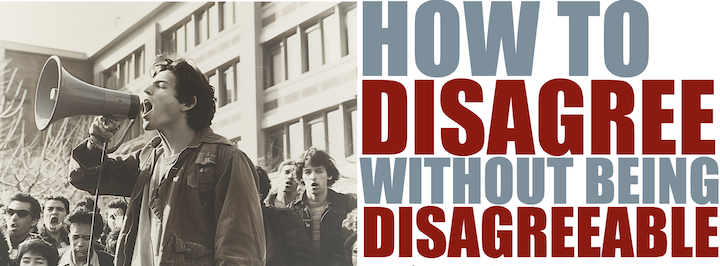How to Disagree Without Being Disagreeable
7 p.m. | September 3, 2024 | The Great Hall in the McShane Campus Center (303)

Advice, Resources, Discussion, Questions, and Answers on Viewpoint Expression in a Caring Community
A joint project of Campus Activities Board, United Student Government, select Fordham Faculty, Rose Hill Student Life, and the newly-launched Civics and Civility Initiative, this event offers advice and encourages discussion by asking the question: in a community like Fordham's- one in which civility is an expectation of all members- how can we best approach viewpoint expression and engage in meaningful dialogue? How can we express views in ways that balance the rights and dignity of all community members with what the University makes clear in its policies and mission is the right of its members “to freely express their positions and to work for their acceptance whether they assent to or dissent from existing situations in the University or society”?
Given deep differences in viewpoint over everything from the ongoing conflict in the Middle East to the impending general election, the University- you may be surprised to learn- is committed to helping individuals and groups in expressing their viewpoint, In fact, it has never in more than three decades refused any request to organize a protest or demonstration. Come learn more.
Please join our panel of speakers and participants in what we hope is civil and engaging discussion on a challenging topic:
Adeyinka Maddy | President, Campus Activities Board
CAB has made the "How to Disagree" event the first of its newly-relaunched American Age lecture series.
Lucas Hjertberg | Executive President, United Student Government
USG has been a main partner and advocate for students in adapting and updating the University's policies related to viewpoint expression for decades.
Michael Baur
Michael Baur has been teaching in the Philosophy Department at Fordham since 1998, and at Fordham's Law School since 2003. He grew up in Los Angeles, California, and did his undergraduate degree at Loyola Marymount University. He holds a Ph.D. in Philosophy from the University of Toronto, and a law degree from Harvard Law School. He has published on a variety of thinkers (from Aristotle to Heidegger), and on a variety of topics (including the philosophy of law, German Idealism, American pragmatism, and contemporary continental thought). He is especially interested in the relation between philosophy and popular culture, and on the question of how our intellectual habits can help us to improve our habits of public discourse.
Lori A. Wolff
Lori A. Wolff, Ph.D., J.D., is a Professor in Fordham’s Graduate School of Education and has been at Fordham since 2016; she earned her degrees from Saint Louis University and Creighton University. In addition to being a faculty member, Dr. Wolff has served as an administrator in both academic and student affairs at various institutions. She also has worked as an attorney and guardian ad litem in public interest law and child advocacy areas. Dr. Wolff has taught statistics, research, and program evaluation courses, as well as courses related to higher education and leadership, including law, conflict resolution, and service learning. Her research interests include higher education leadership, conflict resolution in educational and community settings, and career construction theory.
Anthony Berry | FitzSimons Fellow, Office of the President
Anthony A. Berry joined Fordham in July 2024 as the FitzSimons Fellow in the Office of the President. In this role, he helps coordinate events, programs, and other opportunities across Fordham's various campuses, engaging the community in how to approach difficult topics with civility and how to engage the different levers of democracy. This includes working across colleges and departments to bring in speakers, plan engaging content for students and faculty, and coordinating other special projects for the Office of the President.
Christopher Rodgers | Dean of Students and Assistant Vice President at Rose Hill
The deans of students on each campus work with groups and individuals to plan and coordinate on time, place, and manner elements for events such as demonstrations and protests and are charged with educating the community on the often delicate balance between viewpoint expression, the wide diversity of academic, co-curricular, and business activities taking place on campus, our community's standards for civility, and Fordham's mission.
The program will be composed of brief presentations and a moderated panel for questions from attendees.
Hot and cold hors d'oeuvres served!